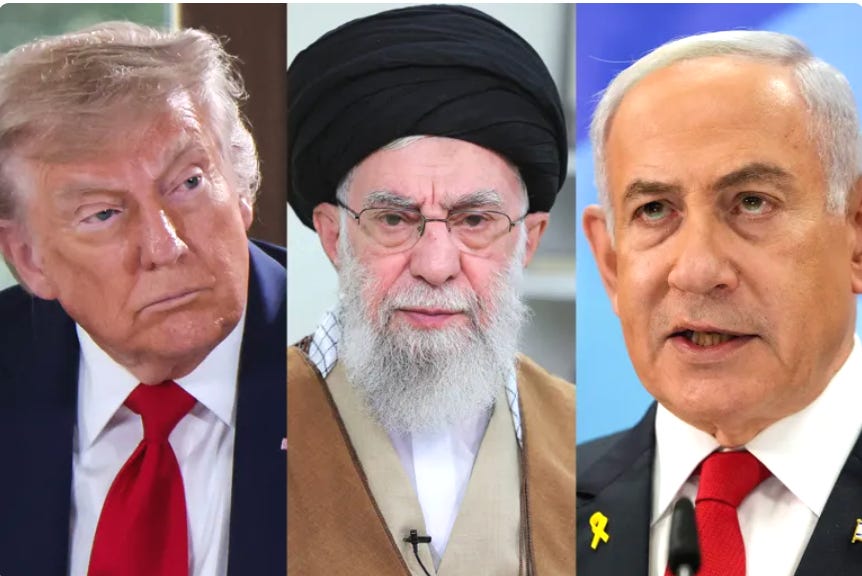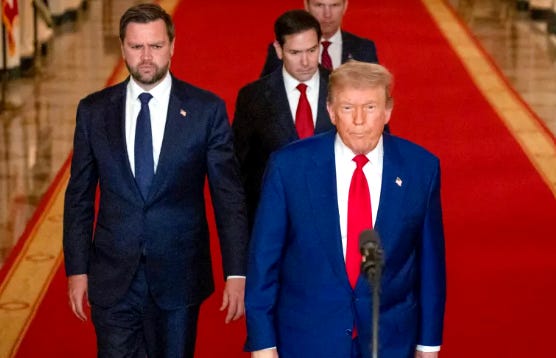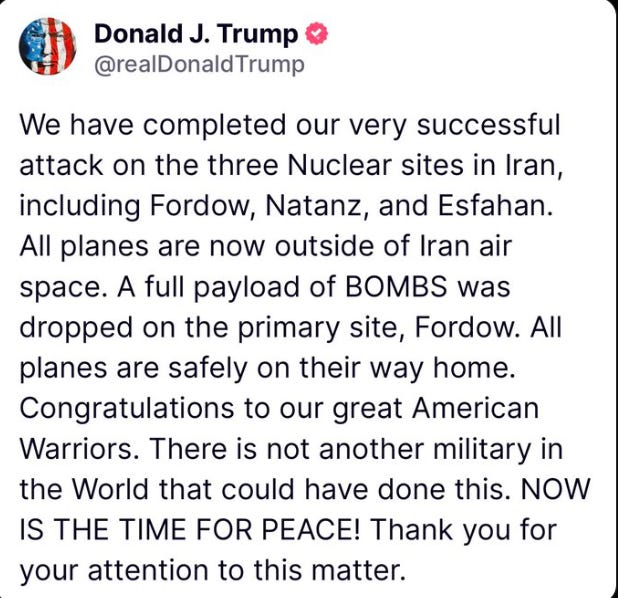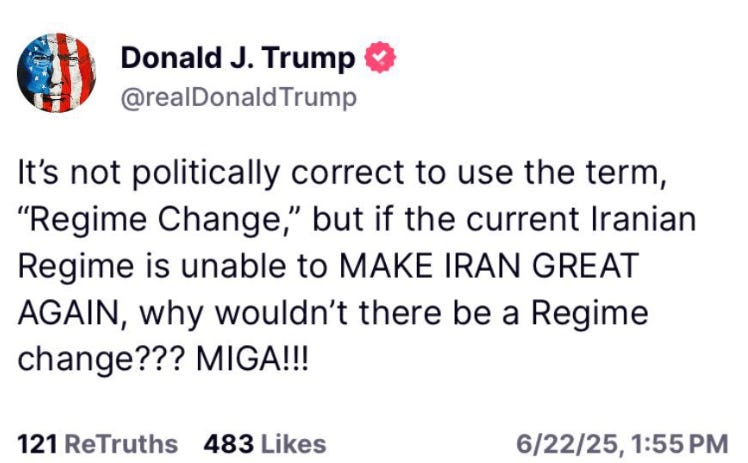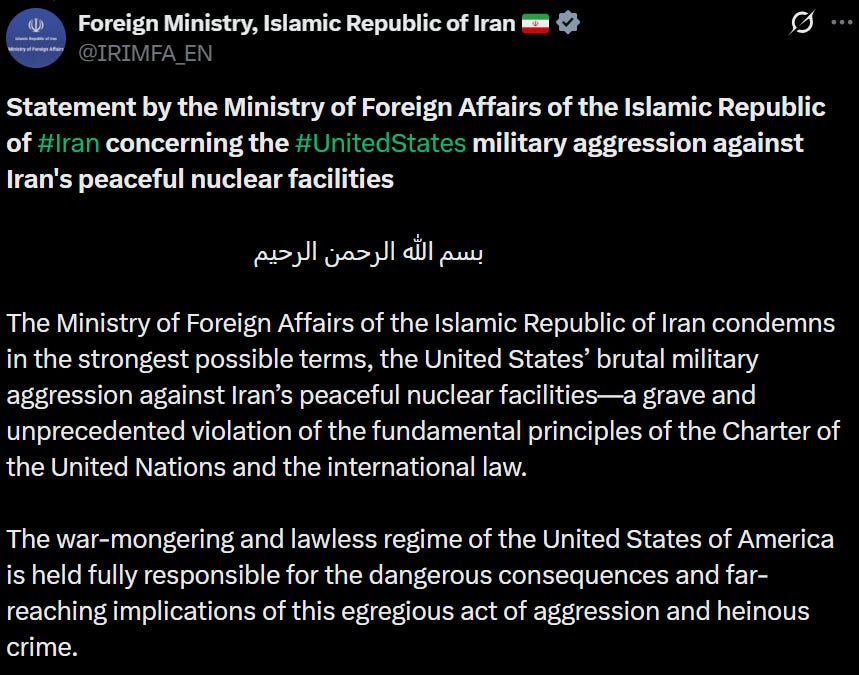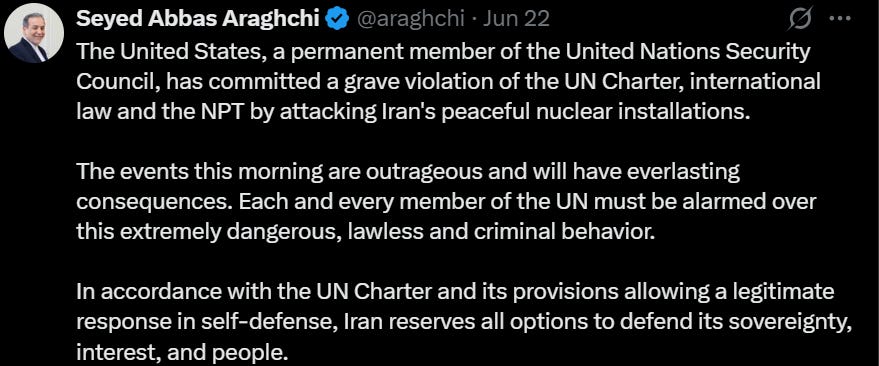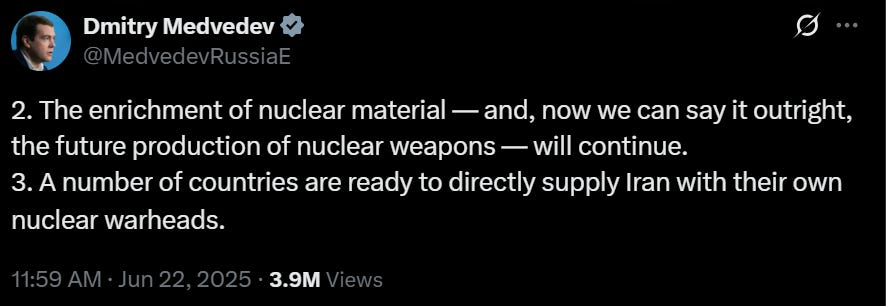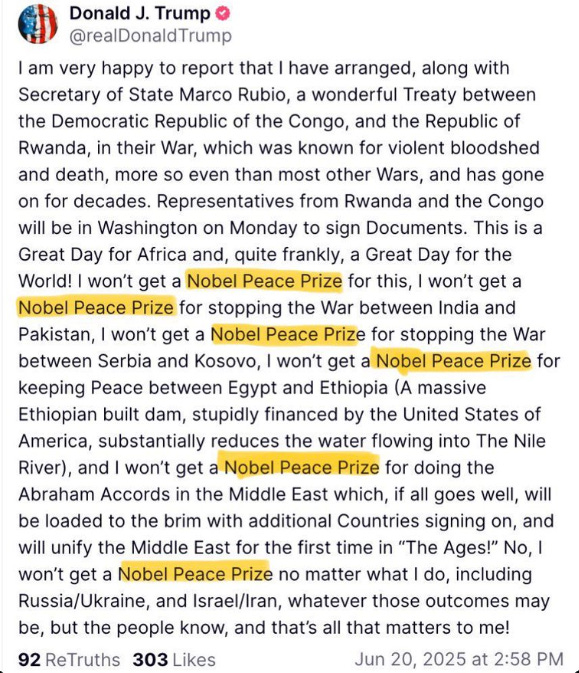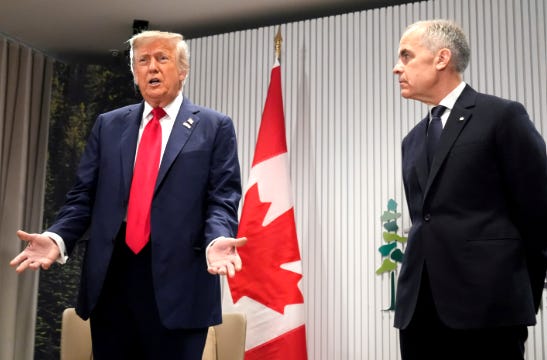U.S. Enters the Israel-Iran War, Trump Slams G7 for Sidelining Russia, U.S. to Consider Extending Travel Ban, Nigeria to Introduce Mandatory Oil Export Permit, and More
Grinfi Political Risk Intelligence Weekly Briefing
Welcome to this week’s edition of Grinfi Political Risk Edge, your trusted source for expert political risk analysis and strategic intelligence. In this issue, we examine key geopolitical events shaping the defense, energy, and DeFi markets, providing a deep, beyond-the-headlines assessment. Anticipate, Adapt, and Excel!
But first, let’s begin the week with a laugh 😄 to brighten the mood.
Help us serve you better and improve Grinfi Political Risk Edge by taking this brief, fully anonymized reader survey.
"I have always believed that the true interest of the United States lies in avoiding all unnecessary connection with the wars of other nations."
James Madison, (1799, August 23). [Letter to Thomas Jefferson]. In The Papers of James Madison (Vol. 17). Library of Congress. https://loc.gov.
Disclaimer: The opinion expressed in this quote does not represent our views but is intended for reflection purposes only.
From Grinfi Political Risk Observatory (GPRO), here’s what we’re monitoring:
High Impact Situational Updates
MAJOR HEADLINES
— US Enters the Israel-Iran War with Strikes on 3 Iranian Nuclear Sites
It is now official that the United States has entered the Israel-Iran war. But at what cost? Was the operation a tacfully choreographed political theater, given reports that the United States allegedly provided Iran with a warning through a backchannel before the supposedly surprise attacks?
On June 22, the United States launched airstrikes on three Iranian nuclear facilities: Fordow, Natanz, and Isfahan. This ushered in a significant escalation in the conflict, which began with Israeli pre-emptive strikes on June 13. The operation, named ‘Operation Midnight Hammer’, involved B2 stealth bombers delivering more than a dozen thirty-thousand-pound (30,000 lb) GBU 57 Massive Ordnance Penetrator bombs on Fordow and Natanz, while over two dozen Tomahawk cruise missiles targeted Isfahan.
President Donald Trump announced the operation on Truth Social, claiming that the strikes obliterated Iran’s nuclear enrichment capabilities.
However, some U.S. officials have stated that damage assessments remain incomplete and that the location of Iran’s near–bomb-grade uranium is unknown.
A senior U.S. official confirmed to The New York Times that Iran was informed of the strikes in advance through diplomatic channels via Oman, allowing it to evacuate personnel in order to prevent escalation. An Iranian lawmaker, Mahdi Mohammadi, told Al Jazeera that Fordow had already been cleared in anticipation of the attack.
Iran’s official news agency, IRNA, reported that the Fordow facility, which is located beneath a mountain near Qom, was damaged but not destroyed. Satellite imagery from Maxar Technologies and Planet Labs showed ash deposits and blocked tunnel entrances at Fordow. Iran’s Atomic Energy Organization confirmed that no radiation leaks had occurred and vowed to continue its nuclear activities.
The strikes were conducted at the request of Israel and represent a sharp departure from Trump’s campaign pledge to avoid new military engagements in the region. The move drew criticism from anti war groups and from parts of Trump’s own political circle. Nonetheless, Trump has doubled down on the attack on Iran by hinting at the need for regime change.
This has sparked more outrage within the MAGA coalition, with some calling his war rhetoric and action “utterly deranged” and “unconstitutional.”
U.S. Vice President J.D. Vance, in an interview with NBC News defending the Trump administration, argued that the difference between Trump’s strike on Iran and those carried out by previous presidents is that “the previous presidents were dumb and that Trump is the only wise president” to launch such an attack. He further added that the strike was not an attack on Iran but on Iran’s nuclear facilities.
On the other hand, Iran’s Foreign Ministry, in an official release, denounced the attack as an egregious act of war and a violation of international law.
In a special statement, Iran’s Foreign Minister Seyed Abbas Araghchi warned of lasting consequences.
Iran’s parliament on Sunday, June 22, voted to close the Strait of Hormuz, a major global oil route, a decision that has disrupted global crude oil flow. According to current reports, the U.S. is now asking China to persuade Iran not to close the Strait of Hormuz.
Russia and China have both issued strong condemnations of the U.S. strikes on Iran. Russia’s ambassador to the United Nations likened the airstrikes to previous U.S. actions in Iraq. The Department of Defense has confirmed that the United States now has 40,000 troops stationed in the region, with the USS Carl Vinson and Nimitz strike groups deployed to deter retaliation from Iran.
Following the strikes, former Russian President Dmitry Medvedev, now deputy chairman of Russia’s Security Council, stated that a number of countries are ready to provide Iran with nuclear warheads, although he did not specify which countries.
Medvedev argued that the U.S. operation failed to destroy Iran’s nuclear infrastructure and instead strengthened the regime by consolidating public support around Supreme Leader Ayatollah Ali Khamenei.
Russia, a longstanding supporter of Iran’s nuclear program, signed a strategic partnership agreement with Tehran on January 17, dubbed the Iranian-Russian Treaty on Comprehensive Strategic Partnership, which oversees cooperation in defense and nuclear energy.
Iranian Foreign Minister Abbas Araghchi is expected to meet with Russian President Vladimir Putin in Moscow today, June 23, to discuss the conflict. Iranian officials have suggested that Tehran may consider withdrawing from the treaty, which could signal an intention to pursue nuclear weapons.
All of this comes at a time when the U.S. president was nominated by Pakistan for the Nobel Peace Prize, shortly after he went on a tirade in which he appeared to be both complaining and justifying why he deserves the award.
Many are now wondering why Trump appears perturbed about not receiving the award that he and his MAGA base have labeled the globalist "Nobel Peace Prize," especially since he describes himself as an anti-globalist and nationalist.
In related news,
In response to rising tensions between Iran and the U.S. following the U.S. airstrike on Iran, the U.S. Embassy in Israel has ordered all U.S. government employees and their families to shelter in place. Simultaneously, the U.S. Embassy in Baghdad has tightened security, relocating non-essential personnel to secure areas. The embassy remains operational under heightened alert.
In Qatar, U.S. citizens have been advised to shelter in place due to threats from Iran and its proxies, including Hezbollah. Similar warnings have been issued for those residing in Bahrain, where U.S. interests may face risks of retaliatory attacks.
Domestically, the U.S. Department of Homeland Security has issued an advisory on increased risks of cyber and lone-wolf attacks by Iran-affiliated actors targeting critical infrastructure and pro-Israel officials.
— Trump Slams G7 for Excluding Russia
At the G7 summit held in Kananaskis, Alberta, on June 16-17, 2025, President Donald Trump sharply criticized the exclusion of Russia from the group, arguing that Russia’s absence undermined efforts to resolve pressing global crises, including the Israel-Iran conflict and the war in Ukraine.
Rejecting a draft G7 statement that called for de-escalation in the Middle East and a ceasefire in Gaza, Trump insisted that Iran’s aggressive actions justified stronger measures.
German Chancellor Friedrich Merz urged Iran to resume nuclear negotiations, emphasizing the importance of preventing Tehran from acquiring nuclear weapons. Meanwhile, French President Emmanuel Macron argued the need for a united G7 front to prevent further escalation in both the Middle East and Ukraine.
Despite these calls for solidarity, divisions within the G7 were apparent. Canada and Japan advocated for stronger sanctions against Russia, while Trump’s push to reintegrate Russia into the group and his veto of measures such as lowering the Russian oil price cap drew criticism from European allies, who viewed his stance as undermining NATO’s position.


